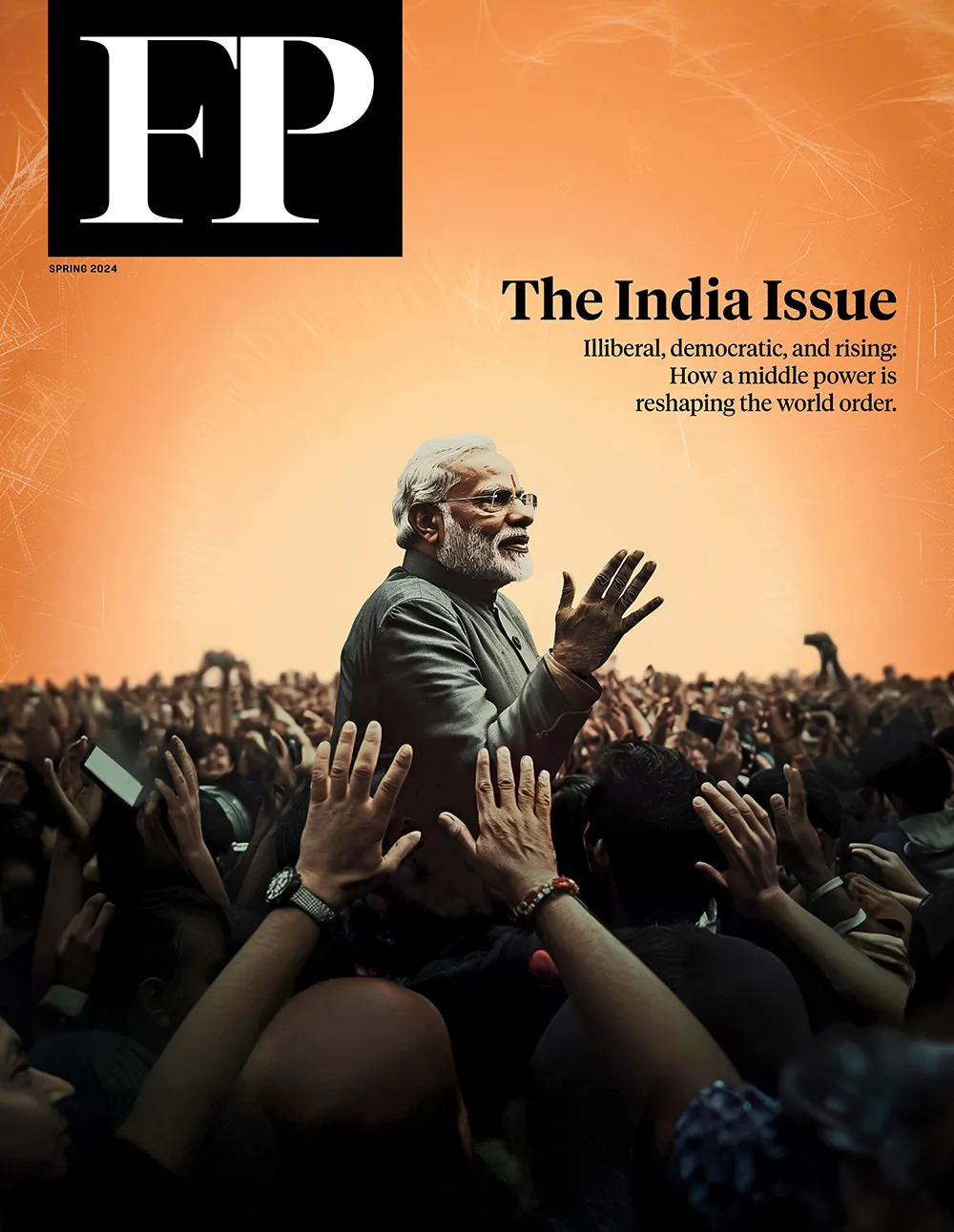Top House Democrat ‘Deeply Worried’ About Israel’s War Strategy in Gaza
Israel is losing the support of Democrats over how it’s prosecuting the war, lawmaker warns.
Welcome back to Foreign Policy’s SitRep.
Welcome back to Foreign Policy’s SitRep.
Here’s what’s on tap for the day: We dive deep on Ukraine and Israel with U.S. Rep. Adam Smith, the top Democrat on the House Armed Services Committee; Ukrainian Foreign Minister Dmytro Kuleba gets real with FP’s editor in chief; and infighting rages in the Kremlin.
“Deeply worried.”
SitRep sat down this week with Rep. Adam Smith, the top Democrat on the powerful House Armed Services Committee. We met while the dust was still settling from a vicious fight on Capitol Hill to push through a major national security funding bill, and with the wars in Ukraine and Gaza poised to enter grim new phases.
SitRep: What is your assessment of how the six-month delay in U.S. aid to Ukraine has impacted the war?
Adam Smith: It really undercut Ukraine’s ability to fight, and then that undercut their morale. Nothing like running out of ammunition to make you feel like your cause isn’t as hopeful as it might be. So I think it’s been incredibly damaging to have had to wait that long. And psychologically, on the other side, Russia feels like they’re winning. Now, can the new influx of aid reverse that? Absolutely.
SR: Can Ukraine take back all its territory? If not, what’s the best hope for Ukraine in the war?
AS: I think what is realistic is that Ukraine and our 50-plus-country alliance that is helping and supporting them are able to build enough capacity so that Ukraine can hold on to what they have. I think we need to be more aggressive about trying to find ways to negotiate directly with Russia to get an end to the war in Ukraine.
The really crucial part of Ukraine’s survival is for them to maintain what they currently have, to not lose access to the Black Sea and to not have Kyiv threatened. If you have that, you have a sovereign, democratic country, and that is an enormous success.
SR: Do the United States and Europe have the defense industrial base to sustain aid to Ukraine in the long run? Are you satisfied with the pace that the West is rearming?
AS: No, I’m not satisfied with the pace. I would have to do a deeper dive to get more precise numbers on this. But if it’s a scale of 1 to 10, when the Ukraine war started, well, let’s just say we were at like a 1. All right. We’re now maybe at a 4. You started to see some increases in production. You’ve definitely started to see some partners increase their production.
SR: What’s your assessment of Israel’s current military strategy in Gaza?
AS: I’m deeply worried about it. I’m deeply worried that they don’t understand that the humanitarian situation in Gaza undermines their long-term security and their overall strategy.
They are not going to kill all the Hamas fighters. They’re just not. Now, they can degrade Hamas. They can create a situation where an alternative to Hamas can emerge. But you can’t create a situation where an alternative to Hamas is going to emerge if people can’t eat.
I think it’s crucial that you get a cease-fire and a pause, so that you can improve the humanitarian situation.
Cutting off aid to Israel, I don’t agree with that. Hezbollah and Iran are sitting there waiting for a sign of weakness that says they can go at Israel and win. And if we cut them off, that massively increases the risk that Iran and Hezbollah are going to make that calculation. We have to have an adequate deterrent to them. Which is why I don’t support cutting off Israel.
SR: Do you think Israel long term is losing the support of the Democrats? It seems like we are witnessing a tangible shift in support for Israel on the left.
AS: I got to be honest: Yeah. I would also caution you to say that Israel is certainly losing support of Democrats in the way they’re fighting the war in Gaza. But just because you don’t support the way Israel is conducting the war in Gaza doesn’t mean that you don’t support Israel.
Let’s Get Personnel
Nebraska Republican Don Bacon has become the new chair of the House Armed Services cyber subcommittee, replacing Wisconsin Rep. Mike Gallagher, who left Congress before his term ended.
Defense expert Miyeon Oh has joined the Rand Corporation as its new Korea Policy chair.
On the Button
What should be high on your radar, if it isn’t already.
Bulldogs under the rug. Former British Prime Minister Winston Churchill once described trying to interpret Kremlin political infighting as akin to watching bulldogs wrestling under a rug: It’s only when you see bones fly out from underneath that you know who has won.
Well, a bone flew out from under the rug last week when Russia’s deputy defense minister, Timur Ivanov, was arrested on Tuesday on corruption allegations. Just hours after he attended a meeting between Russian President Vladimir Putin and the military’s top leaders, he appeared in a Moscow courtroom still in uniform to face charges that could see him jailed for years. The move is widely being read as a bid by rivals of Defense Minister Sergei Shoigu, a longtime mentor to Ivanov, to unsettle him ahead of an expected government reshuffle to follow Putin’s inauguration into his new term later this month.
After the Russian mercenary leader Yevgeny Prigozhin died in a plane crash last year, military power was concentrated in the hands of the Ministry of Defense and the General Staff of the Armed Forces, said Mikhail Khodorkovsky, a former Russian oil tycoon who was imprisoned for 10 years on charges regarded by outside experts as politically motivated. “This clearly is worrying Putin, and he’s trying to create balance,” he said in an interview with Foreign Policy. “Ivanov is now going to be giving testimony against Shoigu and his circle,” he said. “Shoigu will be aware of this and will be careful.”
The AI arms race. Former U.S. Secretary of State and National Security Advisor Condoleezza Rice warned that the race to develop artificial intelligence capabilities isn’t like other arms races in history.
During the Cold War nuclear arms race, there was nobody “in their basement building a nuclear weapon,” she said, speaking to a small group of reporters at Stanford University’s Hoover Institution, highlighting that nuclear technology was always the purview of governments. AI, on the other hand, is being led by the private sector, as well as by universities and the proverbial geniuses in basements. Governments have a small fraction of the computing power and resources to build AI that the likes of Microsoft, Google, and OpenAI do.
Even as it seeks to regulate AI, Rice added, the U.S. government needs to give industry the space it needs to innovate. “[China] had powerhouses called Alibaba and Tencent; they disabled them,” she said. “We don’t want to do that.”
Taliban tax. A State Department office responsible for weapons removal, which works with Afghan and international nongovernmental organizations and other groups to clear land mines and other explosive remnants of war from areas around the country, has paid Taliban entities nearly $1.3 million in taxes since the 2021 withdrawal of U.S. troops, according to a new report from the Office of the Special Inspector General for Afghanistan Reconstruction, the U.S. government’s top watchdog for American conduct in the country. Most of that is in withheld payroll tax and includes about $138,000 spent this quarter.
The Taliban are also asking the U.S. government—which does not officially recognize the group as Afghanistan’s rulers—for more help. In the past three months, Afghanistan’s Taliban-run central bank has asked the State Department for technical assistance to help govern its monetary system. The State Department rebuffed the Taliban, per the watchdog group.
Snapshot
An Israeli army soldier walks past a main battle tank stationed at a position near the border with the Gaza strip in southern Israel on April 30. Menahem Kahana/AFP via Getty Images
Hot Mic
Foreign Policy’s editor in chief, Ravi Agrawal, spoke to Ukrainian Foreign Minister Dmytro Kuleba on Wednesday about how Kyiv plans to spend the roughly $60 billion in much-delayed U.S. military aid that Congress recently approved. Here is a short excerpt of that exchange:
Ravi Agrawal: Does the aid package change your military strategy?
Dmytro Kuleba: There is a time gap between the announcement of the package and the moment when a Ukrainian artilleryman has more shells to fire back at the Russian invaders. And that moment has not come yet, because everything that was announced—we are grateful and we appreciate it—is still on its way. And therefore, in this time gap, bad things may happen, such as the advance of Russian forces on the ground.
The artillery ratio on the ground is incomprehensible. Basically, Ukrainian soldiers are starving because of the lack of artillery ammunition. And in the end, they get bombed and their positions get destroyed.
…
RA: What types of weaponry are you prioritizing with the newly approved aid?
DK: We need artillery ammunition for the front line to stop Russia’s advance. We need air defense systems and missile interceptors to stop Russian missiles falling—literally on the heads of Ukrainians and on our energy infrastructure. We need radio jamming because modern warfare is largely a war of drones and software. And therefore, you need an abundance of electronic warfare to combat these modern, state-of-the-art weapons.
Put on Your Radar
Sunday, May 5: Panama holds general elections.
Monday, May 6: Chad holds its presidential election.
Wednesday, May 8: The Washington Conference on the Americas takes place in the U.S. capital with Dominican Republic President Luis Abinader, U.S. National Security Advisor Jake Sullivan, and U.S. Ambassador to the United Nations Linda Thomas-Greenfield set to attend.
Quote of the Week
“I would not categorize the F-35 as a paperweight.”
—U.S. Secretary of Defense Lloyd Austin claps back at Florida Rep. Matt Gaetz, the latest member of Congress to go after the Pentagon’s much-maligned fighter jet program.
This Week’s Most Read
- What Columbia’s Protests Reveal About America by Howard W. French
- Appeasement Is Underrated by Stephen M. Walt
- Where Global Governance Went Wrong—and How to Fix It by Joseph E. Stiglitz
Whiskey Tango Foxtrot
Honeypot. There’s a potentially messy operational security situation in France, as the Financial Times reports: “Brest is a rainy industrial port … that is home to the French navy and its submarine nuclear deterrent. It has also witnessed a remarkable number of weddings in recent years between female Chinese students and the seamen who work at its naval bases.”
Amid a recent spate of arrests in Germany and the United Kingdom of suspected Chinese and Russian spies, French lawmakers are evidently worried that similar influence operations could be happening in their country as well.
Robbie Gramer is a diplomacy and national security reporter at Foreign Policy. Twitter: @RobbieGramer
Jack Detsch is a Pentagon and national security reporter at Foreign Policy. Twitter: @JackDetsch
More from Foreign Policy

Morality Is the Enemy of Peace
The conflicts in Gaza and Ukraine can only end with deals that don’t satisfy anyone completely.

Why Biden’s Gaza Gambit Is Likely to Fail
The U.S. president wants a truce more than Israel and Hamas do.

Modi’s Taiwan Ties Have Rattled China
India’s overtures to the island have coincided with a breakdown in its relationship with Beijing.

Don’t Bet Against the Dollar
U.S. competitors are pushing the limits of autonomy within a dollar-based system, but there isn’t a real global alternative—and the world is far from an inflection point.







Join the Conversation
Commenting on this and other recent articles is just one benefit of a Foreign Policy subscription.
Already a subscriber? .
Subscribe Subscribe
View Comments
Join the Conversation
Join the conversation on this and other recent Foreign Policy articles when you subscribe now.
Subscribe Subscribe
Not your account?
View Comments
Join the Conversation
Please follow our comment guidelines, stay on topic, and be civil, courteous, and respectful of others’ beliefs.